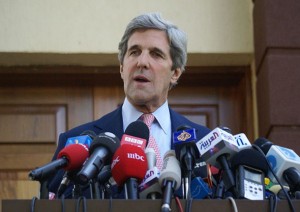by Carly Beckerman-Boys

Despite US Secretary of State John Kerry’s best efforts, the latest spurt of Israeli-Palestinian peace talks seems to have fizzled out. No one is particularly surprised of course but a quick look back at the Obama Administration’s Round Two in Israel-Palestine reveals just how little has been achieved.
Admittedly, Kerry did do a great job arm-twisting both parties back to the negotiating table in late July 2013 with the noble goal of reaching a final status agreement within nine months. As a gesture of (reluctant) good faith, President Abbas and the Palestinian Authority agreed to sit on their bids join UN treaties and conventions that would bolster the UN Non-Member Observer State status that the General Assembly awarded to Palestine in 2012. This temporarily spared Israel the stress of Palestine joining The Hague and, in exchange, Netanyahu’s government (begrudgingly) agreed to release 104 Palestinian prisoners incarcerated since before the Oslo Accords – albeit in four small batches as peace talks progressed. The key issues were supposed to be Jerusalem, security, borders and refugees, but a couple of obvious sticking points emerged.
Almost throughout the entire peace talk period, Israeli authorities have placed immense pressure on Abbas by continuing to approve building settlement projects beyond the Green Line – plans spearheaded by Israeli Housing Minister, Uri Ariel (member of the religious Zionist party, The Jewish Home), who has vehemently opposed all prisoner releases. Indeed, as each group of Palestinian prisoners emerged from their cells, they were greeted by rapturous crowds and general jubilation. This frustrated many ordinary Israelis who, like the hawkish Ariel, struggled to comprehend “how releasing murderers can help peace”.
To complicate matters further, and probably to satisfy the disgruntled members of his coalition, Netanyahu reprised an earlier refrain: “President Abbas, recognize [Israel as] the Jewish state.” Preaching to the AIPAC choir, Netanyahu was essentially asking for the impossible. Agreeing to partition your homeland is one thing; declaring it was never yours to begin with is quite another – although PA heavyweight Nabil Shaath suggested that recognizing Israel as specifically “Jewish” might be possible after Palestinian independence. Abbas’ refusal, however, was another nail in the coffin, and there wasn’t room for many more.
In December 2013, Likud MK Miri Regev had submitted a bill proposing that Israel should annex the Jordan Valley, which is a tacitly agreed part of any future Palestinian state. Then in February 2014, Likud MK Moshe Feiglin initiated an inflammatory Knesset debate about “the loss of Israeli sovereignty on the Temple Mount”, straining relations with Jordan and generally getting everyone’s hackles up. Naftali Bennett, leader of The Jewish Home, threatened to fracture Netanyahu’s coalition if the final peace agreement was “inconsistent with our values”. (Though, speaking to a Bennett confidant, it was readily apparent that no one expected a peace accord of any kind to emerge). And finally, in the context of a public Israeli backlash following Palestinian prisoner-parties and Abbas’ refusal to recognize the “Jewish” state, Netanyahu balked at releasing the final cohort in March as planned – not least because eight of them remain Israeli citizens and another six hail from East Jerusalem.
Meanwhile, Kerry’s valiant efforts to maintain the dialogue have been rather interrupted by unrelenting crises – Ed Snowden and the NSA, Syria’s chemical weapons, Egypt’s “I promise it’s not a coup”, an unsettlingly friendly Iran and Russia’s “blink and you missed it” annexation of Crimea. The Secretary of State also had to endure a few rounds of humiliation thanks to Israeli Defence Minister Moshe Ya’alon, who publicly labelled Kerry as “obsessive”, “messianic”, and declared, “The only thing that can ‘save us’ is for John Kerry to win a Nobel Prize and leave us in peace.” Naturally, Ya’alon apologised – and then did it again.
By April 2014, tension simply overflowed. Abbas called for the release of popular Palestinian leader Marwan Barghouti. Netanyahu offered to release the fourth group as well as a further 400 Palestinian prisoners (mostly women and minors convicted of non-violent offences) if the PA agreed to extend peace talks beyond April. Abbas countered, demanding a total settlement freeze, and Kerry intervened, trying to secure a partial freeze in exchange for the US releasing long-held American-Israeli spy, Jonathan Pollard. Almost simultaneously, the Israeli Housing Ministry announced further building plans and Abbas performed a televised ceremony to sign applications for joining 15 international agreements. Kerry was in Brussels at a NATO meeting at the time, and his return trip to Ramallah was simply cancelled. An all-night effort at damage control between Israeli and Palestinian negotiators ended without any progress, and it would appear that the peace talks are hanging on by a pinkie finger.
Now, I know what you’re thinking. It looks like a disaster but, realistically, nothing has actually changed. Abbas has the power to pursue further recognition for Palestinian statehood in the international arena through peaceful, unilateral methods. There is no atmosphere of utter helplessness like the aftermath of Camp David in 2000. So far, Palestine is applying to relatively low-level agreements like the Fourth Geneva Convention and the human rights covenants. This means that applying to join the Rome Statute and, thereby, the International Criminal Court, is still an ace in the hole. Abbas does have cards to play. Likewise, Israel is unlikely to face a fresh bout of violence, at least the sort that creates an unhelpful cycle of crackdown and reprisal. Even Hamas is largely playing ball by controlling the number of rockets launched out of Gaza. Netanyahu may have escaped releasing the most controversial, “Arab-Israeli” prisoners and he has managed to survive Kerry’s mediation efforts with the coalition government in tact.
Therefore, we shouldn’t pay too much attention to Kerry’s prophecy that collapsing peace talks invites a Third Intifada. The Obama Administration still has a little over two years – and some pesky midterms to weather – so after all, maybe Kerry has time for one more crack. Meanwhile, negotiations between Israel and Palestine will rest relatively peacefully, but they’re not necessarily dead.
 Dr Carly Beckerman-Boys joined the MEC as visiting fellow in March 2014. She is also Visiting Lecturer at London City University. Her research interests include Decision-making during the Palestine Mandate, Politics of the Israel-Palestine conflict, Poliheuristic Theory and Third-party mediation. She also maintains a personal blog on politics related to the Middle East: middleeaststateofmind.com. Carly tweets at @CarlyBBoys.
Dr Carly Beckerman-Boys joined the MEC as visiting fellow in March 2014. She is also Visiting Lecturer at London City University. Her research interests include Decision-making during the Palestine Mandate, Politics of the Israel-Palestine conflict, Poliheuristic Theory and Third-party mediation. She also maintains a personal blog on politics related to the Middle East: middleeaststateofmind.com. Carly tweets at @CarlyBBoys.





